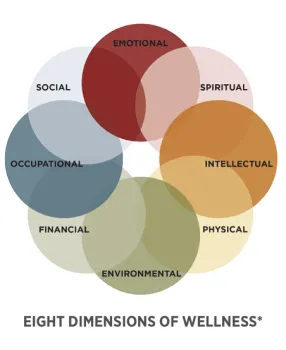Introduction
Humans are very complex systems and require ongoing maintenance. Similar to maintaining a vehicle (e.g. oil changes, etc.), people also have ongoing needs in order to function at optimal levels. Adequate sleep, physical exercise, enjoyable activities, positive relationships, and other factors are important to maintaining a healthy life quality.
Some factors can be outside of our control, such as sickness, job losses, divorces, and other situations. When these challenges occur, it can be especially important for us to take care of our physical, emotional, and psychological wellbeing. One strategy to increase wellbeing is to practice self-care.
What Is Self-Care?

According to the World Health Organization, "self-care is the ability of individuals, families and communities to promote health, prevent disease, maintain health, and cope with illness and disability with or without the support of a health worker." Self-care should help us promote wellness. The Substance Abuse and Mental Health Services Administration (SAMHSA) outlines eight dimensions of wellness to include emotional, spiritual, intellectual, physical, environmental, financial, occupational, and social dimensions.
The National Council for Mental Wellbeing explains that self-care goals can include:
- Taking care of our physical and mental health
- Managing and reducing stress
- Recognizing our emotional and spiritual needs
- Having positive relationships
- Seeking balance in different life areas
Self-Care Strategies
There are numerous self-care strategies. Below are several for us to consider.
- Physical activity: To help with stress, consider activities that promote physical activity, such as walks, runs, playing basketball, dancing, and swimming. The Office of Disease Prevention and Health Promotion provides some guidelines on physical activity here.
- Eat and drink healthy: Follow the USDA's MyPlate guidelines by eating a balance of nutritious foods while minimizing sugary drinks.
- Prioritize sleep: In a previous blog post, I describe the importance of getting enough quality sleep.
- Set boundaries: Consider how your time is spent throughout the day and focus on a balanced schedule that meets your priorities (e.g. work/family balance). Read this Harvard Business Review article on setting boundaries.
Additional Self-Care Ideas
The National Council for Mental Wellbeing outlines a list of practical steps to begin your self-care journey. Consider the following ideas:
- Create affirmation cards (e.g. post-it notes) with encouraging words for yourself and your loved ones
- Meet up with a friend for lunch or coffee
- Create something (e.g. draw, paint, wood work, write a song)
- Listen to your favorite music
- Join a community group (e.g. garden club, book club, etc.)
- Journal your thoughts and feelings
- Schedule a "nothing" day
- Get outside (e.g. take a walk, go for a swim, get some Vitamin D from the sunshine)
- Read a good book
- Meditate or pray
Why Self-Care Is Important
Practicing self-care is an important part of our lives. As we take care of ourselves, we will experience a higher quality of life. One study showed that self-care was related with better health outcomes and reduced hospitalizations and mortality (Merkuri et al., 2023). Another study found that family-centered self-care interventions were related to improvements in anxiety levels (Deek et al., 2016). These studies show the importance of self-care. By practicing self-care, we will support the 4-H motto of "making the best better."
References
Deek, H., Hamilton, S., Brown, N., Inglis, S. C., Digiacomo, M., Newton, P. J., ... & FAMILY Project Investigators. (2016). Family‐centred approaches to healthcare interventions in chronic diseases in adults: a quantitative systematic review. Journal of advanced nursing, 72(5), 968-979. https://doi.org/10.1111/jan.12885
Merkuri, S. L., Kamberi, A. D. F., & Gabrani, P. J. (2023). Self-care for health and wellbeing–a literature review. Medicus, 7(2). https://doi.org/10.58944/qltp2509
